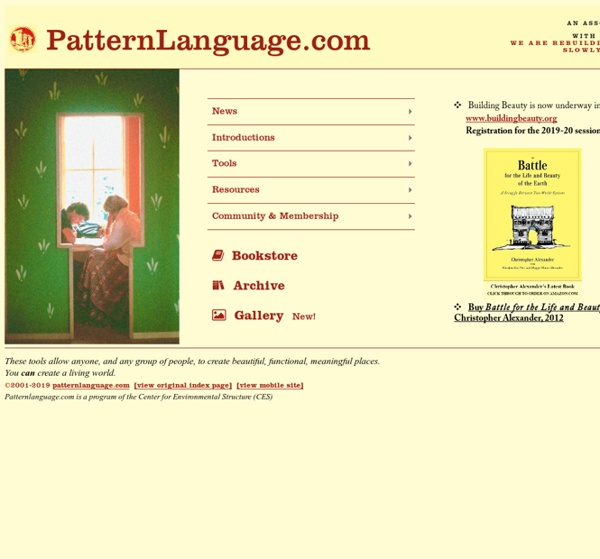



BUILDING LIVING NEIGHBORHOODS If you are one of a group of friends who are talking about building a new place to live a better life, this website can show you ways of working that are inspiring and related to the things which matter in your lives. The ACTION & PRACTICE pages will guide you. If you are a developer or landowner, this website can show you ways of working that are more capable of creating healthy, hospitable and beautiful places for people to live, than present forms of practice typically allow. It does not cost more. See the DEVELOPER'S PAGE. If your family or business is helping to rebuild an old neighborhood, or moving to a new one, this website will give you tools and a voice which will be heard, so you can genuinely influence what happens. If you are a community organizer, or a leader in a local community, this website will give you tools to be sure that residents and local businesses can play an effective and practical part in decision making, which will be heard.
Espagne: démocratie du futur Des assemblées numériques reliées entre elles, un réseau social alternatif, des outils open source et des licences libres en support, le tout coordonné au niveau technique par des hackers. Les acampadas du 15M se préparent à la globalisation du mouvement. Ne croyez pas que le mouvement espagnol s’étiole, bien au contraire ! Il entend passer à la vitesse supérieure, conscient de ses défauts et de ses qualités, et des décisions nécessaires à prendre pour avancer, sur le plan de l’organisation et de la logistique. La révolution, le changement, sont dans la rue et sur les places des quartiers. Mais c’est aussi sur les réseaux que se joue la partie la plus intéressante du mouvement, lancé par la manifestation du 15 mai dernier. ¡HackSol! Dès la formation d’acampadasol et dans les jours qui suivent, les hackers de Madrid décident de prêter main forte au mouvement. Le groupe Hacksol a surgi de lui-même de l’acampadasol. “Mettre l’intelligence collective sur le réseau” Ils expliquent :
Unschooling Philosophy[edit] Children are natural learners[edit] A fundamental premise of unschooling is that curiosity is innate and that children want to learn. From this an argument can be made that institutionalizing children in a so-called "one size fits all" or "factory model" school is an inefficient use of the children's time, because it requires each child to learn a specific subject matter in a particular manner, at a particular pace, and at a specific time regardless of that individual's present or future needs, interests, goals, or any pre-existing knowledge he or she might have about the topic. Many unschoolers believe that opportunities for valuable hands-on, community-based, spontaneous, and real-world experiences are missed when educational opportunities are limited to, or dominated by, those inside a school building. Learning Styles[edit] People vary in their "learning styles", that is, how they acquire new information. Developmental differences[edit] Essential body of knowledge[edit]
Le Livre Absolu Durant l’année 2012 j’ai décidé de publier ici même chaque semaine un billet exprimant mon ressenti personnel sur la semaine précédente, dans la perspective, bien évidemment, des problématiques de la prospective du livre et de l’édition. Ce post est donc le 06/52. Pour la première fois de cette année c’est un fait dont j’ai modestement été l’acteur que je retiendrai comme marqueur de la semaine écoulée. Je veux parler du lancement, ce vendredi 10 février 2012, sur le web 3D, de l’incubateur MétaLectures, conçu comme un environnement immersif pour présenter, expérimenter et développer des solutions innovantes dans l'univers du livre et de la lecture francophones. Cette soirée a réuni pendant presque deux heures une trentaine d’internautes avatarisés de toute la France, et l’événement a pu également être suivi en vidéo live streaming par des dizaines d’autres. Ce type d’expérience (autour de la lecture), vécue et partagée à distance, pose pour moi une question cruciale : que se passe-t-il ?
One The Event - Social Architecture "12 Pillars of Human Endeavor" Origins Originally designed by futurist & social architect, Barbara Marx Hubbard, Founder of the Foundation for Conscious Evolution, the 12 Pillars shown here (above) match & advance Barbara's popular12 point Wheel of Co-Creation (right) based on the Model of the Peace Room, which focuses on a world that works for all. many others including officials in Washington DC saw this wheel as an open-source tool that would help us define and bridge us from old hierarchical systems to ones based in co-creation and bridging resources and needs in evolutionary ways. How we use it Each pillar is self explanatory. Embracing Whole-System(s): Beyond the Pillars While the Pillars cover the WHAT (solutions, impact areas, and issues); facilitating meaningful collaboration also requires coherence, trust and synergy. More about the 12 Pillar Model & its Purpose
L'intelligence collective On trouvera ici une versionPowerpoint™ de cet exposé. L’Internet n’est pas une technologie comme les autres, il a une valeur et un potentiel anthropologiques. C’est sur ce principe que Pierre Lévy, sociologue réputé, fonde le concept d’intelligence collective dans son ouvrage L’Intelligence collective : pour une anthropologie du cyberspace paru initialement en 1994. La juxtaposition des deux termes n’est pas choisie au hasard : ici, " intelligence " doit être compris comme dans le sens de " travailler en bonne intelligence " par exemple. L’expression finale se rapporte finalement à deux choses : Le concept à valeur politique au sens large, celui se référant à toutes les activités humaines en société organisée. I ? De par sa formation, Pierre Lévy a les compétences requises pour comprendre et analyser les problématiques liées à l’impact des nouvelles technologies sur les systèmes de signes et l’évolution culturelle en général. " Qu’est-ce que l’intelligence collective ? II ?
Peer-to-Peer Learning Handbook | Peeragogy.org Pierre Lévy on Collective Intelligence Literacy | Augmented Collective Intelligence